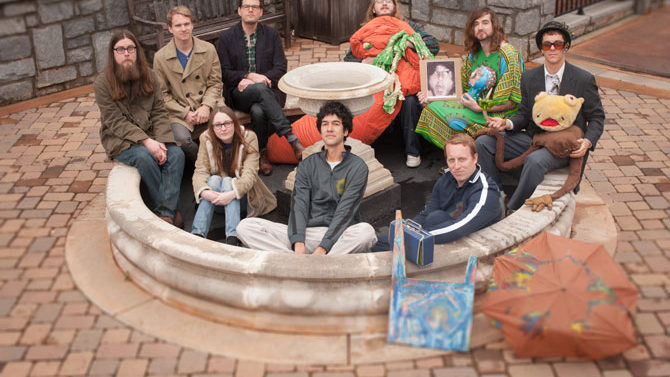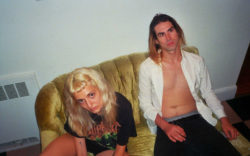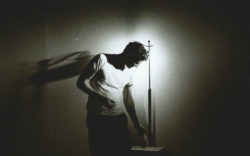ROCK AND ROLL IS DEAD
Imagine that rock and roll is no more in Athens, Georgia, U.S.A. From the void appears an animate and progressive collection of musicians who establish a fundamental new sound. They harness the anarchic power of rock music and divert it down an alternate sonic path. Guitars are burned. Synths and samplers are the new currency.
In the real world, rock’s grip on our town, held firm since the days of Stipe and Schneider, will not loosen any time soon. But a creative nebula has recently emerged, a new underground of experimental-minded musicians that is as tight and supportive as it is individualistic and unwieldy.
“The way this particular community has come together is really inspiring,” says Donald Whitehead, ringleader of beat-collage crew Future Ape Tapes, “in the sense that everyone has come from different places to do their own thing independently, but in ways that strangely seem to complement each other. In the sense that it’s a ‘scene’ at all really seems to be a happy coincidence.”
Chalk it up to serendipity. Rachel Evans, a LaGrange transplant who records and performs solo as Motion Sickness of Time Travel and makes up half of ambient duo Quiet Evenings, recalls that Robert Ashley of I Come to Shanghai—a band that moved to Athens last year from northern California—wrote her with an invitation to play here in town, unaware that she and her husband, Grant Evans (the other half of Quiet Evenings) were then in the process of relocating to nearby Winterville.
Says Ashley, “I had written [Rachel], and I was like, ‘Hey, I really like your record. If you ever want to play a show here—I don’t know what to do about that, but I can try.'”
NEW TO TOWN
Much of the new underground’s momentum seems to stem from the fact that most of these musicians are newly established Athenians—slates blank, minds open. Also, there is the small matter of necessity. Though there is no shortage of experimental talent in Athens, that community has long been hopelessly fragmented, due largely to the fact that there isn’t an established experimental venue on the downtown landscape. Even the chances these artists do have to showcase their music are met with confusion or, occasionally, outright hostility; a couple well-known members of the local rock community traded snarky verbal high-fives during a recent and particularly out-there Motion Sickness of Time Travel set.
Grant Evans, whose solo work is dense, cloudy and often difficult, isn’t surprised at how his work is often received by the bar crowd. “Noise music, by default, is typically an antisocial endeavor,” he says. In fact, “I was instantly drawn to that aesthetic,” he says. “I don’t necessarily harbor any bad feelings towards pop or rock music—depending on who you ask, they’re nothing but noise, too.”
Still, it seems counterintuitive, in an open-minded burg like Athens, that so-called “experimental” music would be met with resistance. In many ways, it seems, our creative community is slower to progress than our wider one. While we have shown an ability to enter into a relatively healthy debate about the future of our downtown, and while we drive away the Walmarts that would seek to strip away our cultural identity, we are slower to respond to threats to our musical fabric.
We also often neglect to encourage its growth, beyond an unwritten mandate to keep our downtown scene thriving—a rule ostensibly geared towards bolstering our arts scene but which, like most things, has its roots in money. Locally bred artists continue to emigrate to cities with more inclusive reputations. And still we rock blindly on.
“The bar and restaurant dynamic can be counterproductive for artists trying to do anything other than rock and roll,” says Whitehead. “It seems like the challenge now is to find new spaces and ways to make shows or listening experiences more interactive for the audience, and more open towards the community in general.”
If it is time for a change, that doesn’t mean everyone has to start listening to strange music, or hang up their guitars. It just means we should share and learn. Because whether or not we all connect with the music, if there is one thing the new underground can really teach us, it is that monotony is death.
SHARING THE STRUGGLE
It should be noted that, though there are stylistic similarities to be found and an obvious philosophical connection among many of these musicians, it is unfair to term Athens’ new underground a “scene.” It isn’t about a sound, nor is it a style. An attitude, maybe. Above all, there seems a shared sort of struggle, a desire to go beyond the typical forms of musical discourse, and to do so in a largely unwelcoming environment, both creatively and financially speaking.
Grant Evans laments Athens’ party-minded music community. “I know that there is more to Athens than a couple of old bands who were popular with my parents’ generation, he says, “but the fact of the matter is people… come here to party and to have a good time.”
But the new economic reality has inadvertently trimmed some of the fat, says Whitehead, this article’s lone native Athenian: “When I was growing up, I remember it just being so easy to play music. It was quite common to play a show and have nobody there and still get paid. [Now], people are really doing it because they love it, and there’s a lot of friction associated with that that I don’t remember being there in the past.”
That’s not necessarily bad, he says. “I think it really weeds out a lot of people… If [music is] not coming from a pure place, that can be problematic.”
There is a singularity about these artists’ music, but it takes wildly divergent forms. The confounding Cult of Riggonia, a Macon-born group that takes cues from digital-era performance art, lo-fi bubble-pop and costumed tribalism, has released several good-to-great cassette tapes, each side a 20-minute psychedelic excursion through a different babbling brook. The band maintains a confounding public profile—its website features various untranslatable homemade YouTube clips; its members go by pseudonyms like Raj, Martian and Willie D—but, rather hilariously, in person, they are among the most straight-shooting of this article’s wild bunch.
“I don’t know if there are even that many commonalities,” says the friendly, gregarious Martian, of his newfound community. “It’s more that we can relate about maybe thinking about music a little differently than a lot of other bands in town.”
Despite the struggle, there is a certain freedom about flying under the radar. “To not be under a microscope is kinda relieving, in a way, for the creative process,” says Whitehead.
A LIVING RELATIONSHIP
“Everybody here takes it personal,” says Future Ape Tapes’ Thomas Valadez, who also performs as Tom(b) Television. He’s standing in the woods, amid a rather grotesque collection of gnarled and naked tree limbs, in a circle of his colleagues and collaborators.
“We’re all trying to do new things,” he continues. “We’re interested in the feedback at the end of an album; that’s where we would begin a lot of our stuff. Musically, what we’re doing in Athens—I think it’s important, because it is blatantly personal. We’re playing small shows to each other. I think that’s really a progression of people understanding music… making it personal, and realizing it’s not something where it’s about an audience, and [a performer] on a pedestal. It’s more about having a living relationship with it.”
All of these artists have a living relationship with their music; their music, too, lives. Last week, Future Ape Tapes released Somnambuland, an album a year and a half in the making. It’s an ecstatic thing, full of jumpy, robotic rhythms and processed organic sounds. It’s also surprisingly accessible: guitars dot the record’s jagged landscape, strange but familiar shapes on the horizon, while Valadez’s vocals alight on top of buoyantly melodic lines. The group’s onetime hip-hop focus has all but evaporated, though some of the beats remain.
The “living relationship” concept applies to how these bands interact with one another, too. I Come to Shanghai, a group that marries pop sensibility with synth exploration, found an unexpected home among the new underground, admitting that the Evanses’ highly experimental music, in particular, has influenced the way they approach their more traditional work.
“Robert and I definitely invest a lot of time in various kinds of rock music—we just happen to enjoy texture and timbre as much as we enjoy lyrics and melody,” writes member Sam Frigard in an email. “So, there’s a constant attempt to marry the two. I think when you really explore the possibilities of pop music you can wind up in some very strange, beautiful places.”
Rachel Evans, too, describes her and her husband’s musical growth as having been encouraged by their new community. “When we started making this kind of music and really pursuing it, we lived in complete isolation,” she says. “When we came to Athens, we were expecting our isolated community of two to continue that way, and didn’t really expect any other musicians to reach out to us. Now that they have, and we do feel this connection to other people in town, it’s very strange adjusting to it… It’s been really welcoming and almost magical how people, not meaning to… we all ended up here at the same time.”
Cult of Riggonia’s Willie D agrees, and assesses the situation with transcendental simplicity. “It’s there. It’s present. It’s happening.”
Cult of Riggonia hosts a residency at Flicker Theatre & Bar every Thursday in April. See Calendar for this week’s listing.
Like what you just read? Support Flagpole by making a donation today. Every dollar you give helps fund our ongoing mission to provide Athens with quality, independent journalism.










